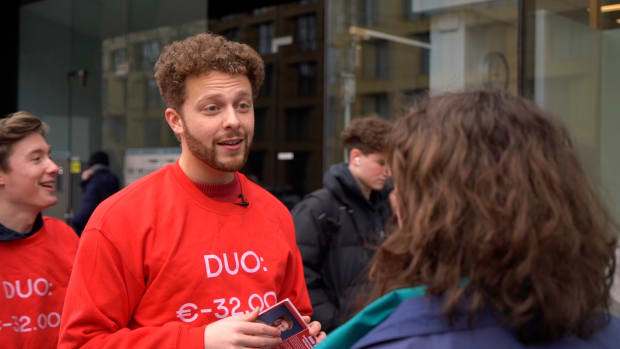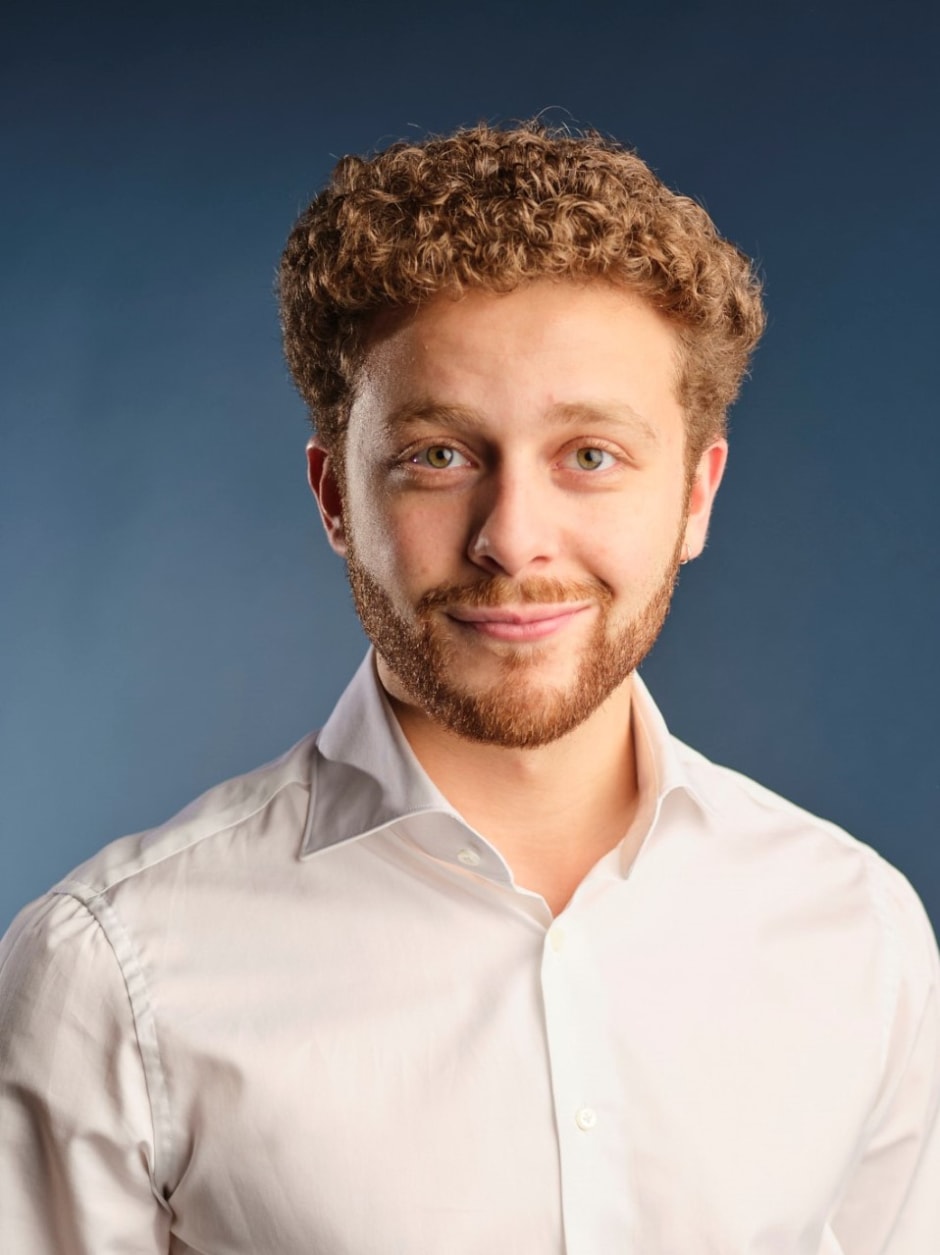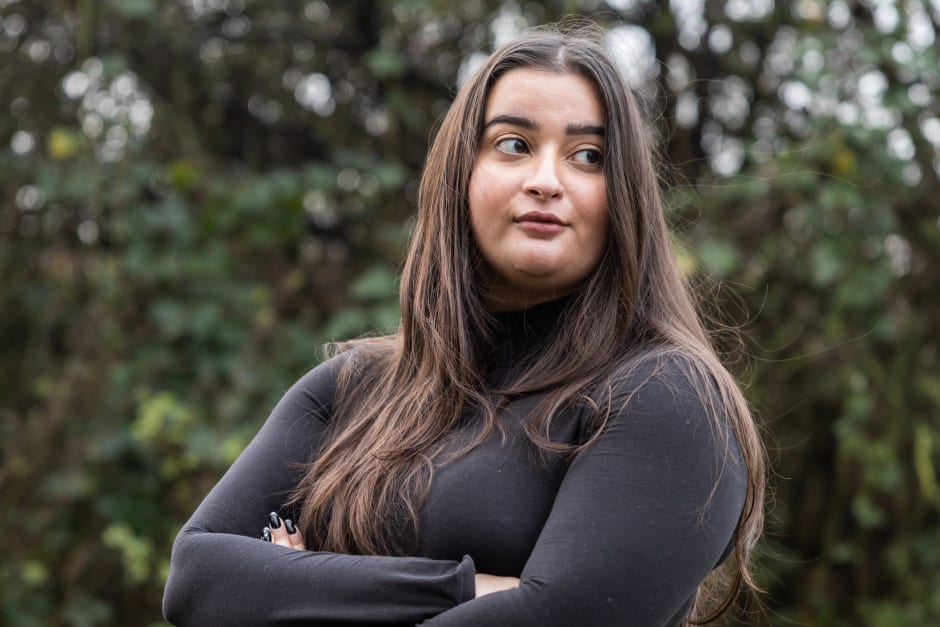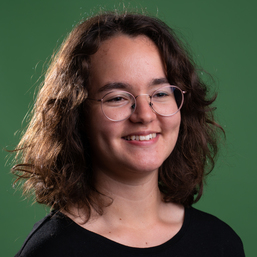
These students and staff from UvA are electable: “Students should not be left out in the cold”
Wednesday we vote for the Provincial Council and Water Board elections. Some UvA students and staffmembers are also up for election. “I find it strange that cleaners and teachers are now struggling to make ends meet.”
“I used to want to be an actor,” says master's student Amar Karar (political science, 23). That has since changed - now he wants to go into politics. And he's starting early: while writing his thesis, he's on spot No. 6 on the PvdA electoral list in North Holland for the Provincial States. “I feel at my best when I can help people.”
His enthusiasm rubs off when he and his colleagues, friends, and girlfriend hand out PvdA flyers at the Albert Heijn supermarket on Sarphatistraat – next to it, since an employee does not allow it right in front of the door. "Do you already know who you are going to vote for?" he asks a passerby. Regardless of the answer, everyone wants to have a conversation with him, and then he lets loose.

Equal opportunities
Karar joined the PvdA to work for equal opportunities. “I find it strange, for example, that people who work as cleaners or teachers now have trouble making ends meet. Let alone people earning well below average.”
His fight against racism, gender inequality, and poverty, among other things, stems from his youth, he says, in which he experienced unequal treatment first hand . Even now, he is still regularly checked when he enters or leaves a store with his Egyptian father, “something that never happens when I am with my Dutch mother.”
Karar says: “I have seen that North Holland is totally different for my father than for my mother. My father feels a strong connection here, especially with other Egyptians who emigrated to the Netherlands. They sometimes speak Dutch poorly and feel alienated from the ‘normal Dutch.’”
As far as higher education is concerned, he cannot - if elected - have a direct influence at the provincial level. But his influence on behalf of his fellow students would be all the stronger, he indicates. “Topics at the provincial level affect students' lives. For example, I want to fight hard against energy poverty, which also affects students.”
And that's necessary too, Karar believes. “Putting on an extra sweater against the cold is fine, of course, but I also know students who set their heating so low because of the high prices that they wake up from the cold. Plus, cold houses are prone to mold, which is not healthy. That's why I'm committed to insulating homes.”

Commuters
Another person studying at the UvA on the list for the Provincial Council elections is Jaya Noordman (21, political science), who was born and raised in Flevoland. She is active for GroenLinks, and is No. 2 on the list in her home province.
Unlike Karar, Noordman knew for years that she wanted to go into politics. “That was a given.” But her candidacy for the Provincial Council was a spontaneous choice. “After my internship with GroenLinks, I wanted to stay committed to the party. It helped that I really enjoy working in politics because I love to dive deep into issues to improve policies.”
Noordman also wants to work on issues that affect students. For example, she advocates better public transportation in her province. “The route between Almere and Amsterdam works perfectly. But Flevoland also includes the Noordoostpolder. The train that runs between Zwolle and Lelystad does not stop at the small stations. So students who live in that region and want to study in Amsterdam either have to move or commute for hours a day. I want a line that also stops at small stations.”
Cooperation between PvdA and GroenLinks
Karar’s and Noordman’s parties decided to merge in the Senate. In Zeeland, too, the PvdA and GroenLinks drew up a joint electoral list. In the Provincial Councils of North Holland and Flevoland, GroenLinks and the PvdA still operate separately from each other but are on excellent terms.
Karar is extremely positive about the cooperation with GroenLinks. “We work well together on the issue of energy transition because that is both green and red. It is important to move toward sustainable fuels as soon as possible while simultaneously reducing, not increasing, economic inequality. With purchasing power going down due to inflation and high energy prices, people feel that something has to change.”
Upper House
After the Provincial Council formation, for which Karar and Noordman are on the list, the Upper House elections will follow. Since the members of the Senate are elected by the brand-new Statesmen, so-called stepped elections, the upcoming elections are also crucial for national politics. After all, without a majority in the Senate, the government must seek support from opposition parties for every bill, as is currently the case: the coalition of VVD, CDA, D66, and ChristenUnie holds only 32 of the 75 seats.
The VVD recently chose to attack the “left group” in De Telegraaf, through Prime Minister Mark Rutte and Senate list leader Edith Schippers. “The left can become big again,” Karar believes. If the PvdA and GroenLinks actually become big in the Senate, the prime minister told the newspaper, they will “make a serious dent in your wallet by raising at least nine taxes.”
Statements about the future of national politics are not taboo for the VVD in the run-up to the Provincial Council elections. Vigilance is called for in this regard, says UvA professor of jurisprudence Jonathan Soeharno, who is No. 10 on the CDA list for the Senate. “I don't think indirectly campaigning for the Upper House elections conforms well with constitutional law.”
Legal expertise
Soeharno is no stranger to Hague politics. A year ago, he spent six months in the Senate. There he noticed that the Senate was becoming increasingly politicized, something he is not in favor of. “The Senate should not start setting the agenda of the Lower House,” Suharno says. “In that respect, I am a bit old fashioned.”
What the Senate is all about, according to Soeharno, is testing bills for their “legality and enforceability.” Such a constitutional test is ideally suited for someone with legal expertise. But that is exactly what is lacking in the Senate, says Suharno, who believes there are too few lawyers in the Senate.
It does not look like the law professor can change that in the coming years. Based on the polls, his spot on the electoral list is not enough for a place in the Senate. EenVandaag expects five seats for the Christian Democrats in the Senate; the CDA currently has nine.


